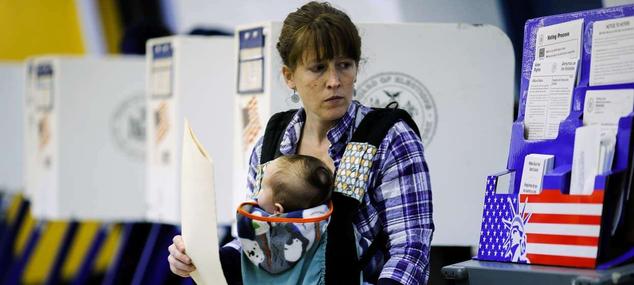Story Highlights
- Americans give GOP 37% favorable rating, Democrats 39%
- First time neither party's rating has reached 40%
- Republicans' favorability dips after hitting 42% last fall
PRINCETON, N.J. -- Thirty-seven percent of Americans now view the Republican Party favorably and 39% view the Democratic Party favorably. This is the only time since Gallup began tracking the party's images this way in 1992 that neither party has achieved at least 40% favorability from the public.
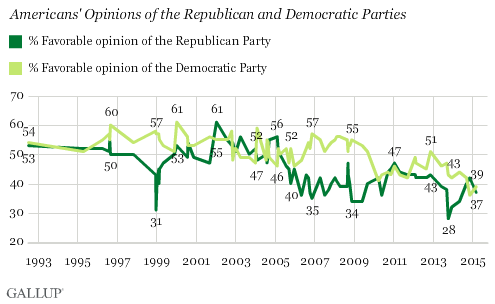
Over the years, Americans' perceptions of the major parties have tended to conform to two patterns. At times -- such as in 1992, 1996 and in the post-9/11 years of 2001 through 2005 -- Americans viewed both parties favorably. At other times, the public viewed one party -- typically the Democratic Party -- much more favorably than the other. This was evident in late 1998 as the Republican-led U.S. House of Representatives pursued impeachment proceedings against then-President Bill Clinton, as well as from 2006 through 2008 as President George W. Bush's popularity waned during the Iraq war; in 2009 at the start of President Barack Obama's presidency; and again in 2013 during the government shutdown, when Republicans' favorable rating plunged to 28%.
Except for a brief spike to 51% for the Democrats after Obama was re-elected in 2012, both parties' ratings have registered below 50% since 2010. The descent to sub-40% ratings for both parties marks a new low in an already inauspicious trend.
Republicans' Favorability Has Dipped Five Points Since Midterms
Republicans' favorable score is down from what Gallup recorded last fall, both before and after the 2014 midterm elections that resulted in the Republicans gaining seats in the U.S. House of Representatives and taking control of the U.S. Senate. Forty percent of Americans viewed the Republican Party favorably last September, and that rose to 42% just after the elections in November before falling in the current survey.
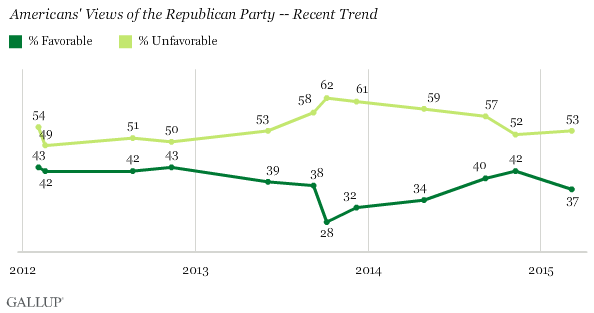
Whether the current dip to 37% represents a return to "normal" -- 34% viewed the GOP favorably last spring -- or reflects specific public concerns about the party's performance since taking power this year, isn't entirely clear. In any case, the current demographic patterns in favorability toward the GOP are roughly similar today to what they were in April 2014, after improving in most categories last fall.
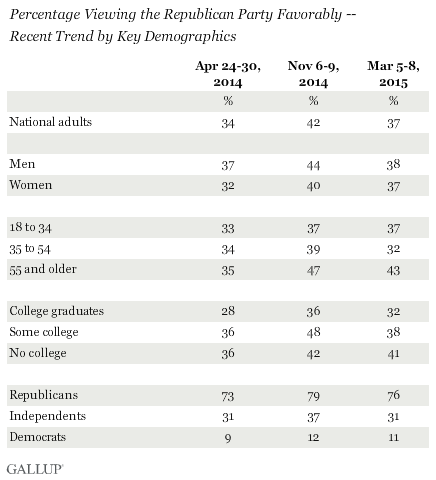
Democrats Favorability Remains Near Record Low
Meanwhile, at 39%, Democrats' current favorability is up slightly from the record-low 36% after the 2014 midterms, but is still among the lowest recorded for the party on this measure. By contrast, in the same poll Obama received a 49% favorable rating, up from 42% after the midterms.
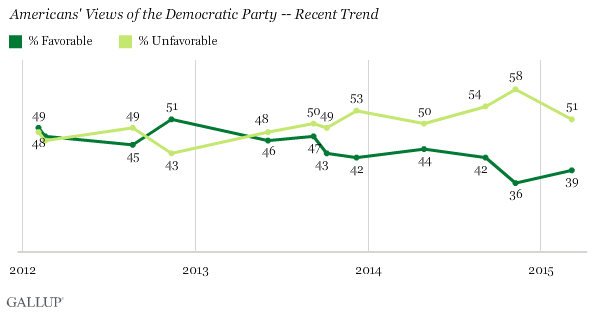
Bottom Line
For some time, numerous Gallup trends have been showing Americans largely displeased with government's performance and leadership. Through it all, at least one political party was reviewed well, but now -- perhaps because of the constant brinksmanship going on between Obama and the Republican Congress, but maybe for other reasons -- both parties are floundering.
Survey Methods
Results for this Gallup poll are based on telephone interviews conducted March 5-8, 2015, with a random sample of 1,025 adults, aged 18 and older, living in all 50 U.S. states and the District of Columbia. For results based on the total sample of national adults, the margin of sampling error is ±4 percentage points at the 95% confidence level. All reported margins of sampling error include computed design effects for weighting.
Each sample of national adults includes a minimum quota of 50% cellphone respondents and 50% landline respondents, with additional minimum quotas by time zone within region. Landline and cellular telephone numbers are selected using random-digit-dial methods.
View survey methodology, complete question responses, and trends.
Learn more about how Gallup Poll Social Series works.
